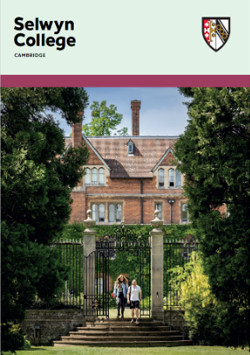The subject at Selwyn
Classics has always had a key part to play amongst the arts subjects at Selwyn (even the inscription over the College gatehouse is in Greek!). Although numbers taking the subject in any one year are not large, this means that Classics undergraduates are normally taught in small groups.
Classicists at Selwyn are entirely free to choose whichever optional papers appeal to them. Emphasis is placed on securing the services of the best teaching for each paper.
The College Library is well stocked with books needed for Classics courses. Selwyn is the nearest mixed college to the Classical Faculty (literally a two-minute walk from the back gate), which houses a comprehensive library and is also where lectures and seminars take place.
Teaching in Classics
The Director of Studies in Classics is Dr Rupert Thompson who specialises in classical philology and linguistics. Dr Benedick McDougall is the Centenary Research Fellow at Selwyn and focuses on Hellenistic, Imperial, and late-antique Greek literature.
Qualities we are looking for
Those intending to read Classics at University tend by the nature of things to be committed to their subject. We want to recruit Classics undergraduates who have been intrigued by what they have so far discovered about the ancient world and want to find out more. Classics at Cambridge is a tough course: a candidate for Part I may end up taking nine papers, calling for a wide range of skills (translation, literary criticism, essay-writing). We select candidates who combine intellectual stamina and curiosity. The course caters for applicants with all levels of Greek and/or Latin - and for those with no previous experience of the classical languages.
Subject requirements
If you are studying Ancient Greek to A-level (or equivalent) but not Latin, you must apply for the four-year course as it is easier to maintain your Greek whilst learning Latin, than to add intensive Latin to the very demanding first year of the three-year Classics course. All students applying for the three-year course must be studying Latin.
Interviews
Applicants receive one or two subject interviews. We will be interested to discuss with you any pieces of classical literature you may have read or other engagement with the classical world. If you have experience in one or the other language, you may be asked to translate some Latin or Greek as part of the interview process.
You will also have a shorter general interview. This is intended to let us find out more about your motivation in applying for Classics at Cambridge. It is intended to give us a fuller sense of your aptitude for your chosen course, the maturity of your approach towards academic work, and your classical and other interests.
Written work
Candidates are asked to send in advance two pieces of recent marked and relevant class-work. They may be used as the basis for discussion in part of the subject interview.
Admissions Assessment
Applicants for the three-year course will be asked to complete a language skills assessment as part of the interview process.
Applicants for the four-year course will be asked to take part in a linguistic aptitude assessment exercise organised by the Faculty of Classics. For applicants who have no qualification at all in Latin or Greek, this does not presuppose any prior knowledge of any particular language. Applicants who have, for example, a GCSE in Latin or Greek might be set questions on that language.
October 2025


